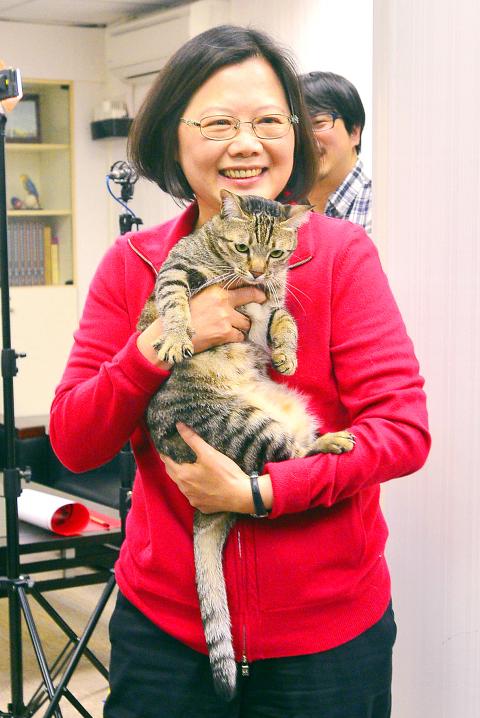Democratic Progressive Party (DPP) Chairperson Tsai Ing-wen (蔡英文) yesterday announced that she would join the party’s primary for the presidential election next year.
“I have decided to join the DPP’s primary for president,” Tsai said on Facebook. “I have my dreams; I have my determination. I believe that resolute implementation of policies needs to be backed by calm thought.”
“Breaking through difficulties requires a strong will,” she said. “The nation needs reform, but pain will certainly accompany it; therefore I will unite with social forces and together we will solve the challenges the nation faces in a steady manner.”

Photo: Wang Yi-sung, Taipei Times
Tsai said that she does not mean to take Taiwan into “an age of the DPP or an age of Tsai.”
She said she would instead create an age that belongs to the public, an “age of [a] new politics of transparency, honesty, public participation, tolerance, clear division of power and responsibility, as well as firm protection of national sovereignty,” she said.
Tsai spoke of how she took over party leadership in 2008, when the DPP was facing its most difficult time, and resumed party leadership last year, after the Sunflower movement, when “party politics” became a negative term in the eyes of many.
She said she is focused on keeping the DPP vital and a good option in the political market.
Tsai said that the government should not just sit aside and watch people struggle to survive on their own and suffer under the leadership of President Ma Ying-jeou (馬英九), adding that this was why she decided to run for president again.
Tsai’s office announced that she would register at 11am today as a candidate in the party primary.
Tainan Mayor William Lai (賴清德) and former DPP chairman Su Tseng-chang (蘇貞昌), who were both considered likely to enter the primary before announcing they would not, sent Tsai messages wishing her luck.

CHAOS: Iranians took to the streets playing celebratory music after reports of Khamenei’s death on Saturday, while mourners also gathered in Tehran yesterday Iranian Supreme Leader Ayatollah Ali Khamenei was killed in a major attack on Iran launched by Israel and the US, throwing the future of the Islamic republic into doubt and raising the risk of regional instability. Iranian state television and the state-run IRNA news agency announced the 86-year-old’s death early yesterday. US President Donald Trump said it gave Iranians their “greatest chance” to “take back” their country. The announcements came after a joint US and Israeli aerial bombardment that targeted Iranian military and governmental sites. Trump said the “heavy and pinpoint bombing” would continue through the week or as long

TRUST: The KMT said it respected the US’ timing and considerations, and hoped it would continue to honor its commitments to helping Taiwan bolster its defenses and deterrence US President Donald Trump is delaying a multibillion-dollar arms sale to Taiwan to ensure his visit to Beijing is successful, a New York Times report said. The weapons sales package has stalled in the US Department of State, the report said, citing US officials it did not identify. The White House has told agencies not to push forward ahead of Trump’s meeting with Chinese President Xi Jinping (習近平), it said. The two last month held a phone call to discuss trade and geopolitical flashpoints ahead of the summit. Xi raised the Taiwan issue and urged the US to handle arms sales to

State-run CPC Corp, Taiwan (CPC, 台灣中油) yesterday said that it had confirmed on Saturday night with its liquefied natural gas (LNG) and crude oil suppliers that shipments are proceeding as scheduled and that domestic supplies remain unaffected. The CPC yesterday announced the gasoline and diesel prices will rise by NT$0.2 and NT$0.4 per liter, respectively, starting Monday, citing Middle East tensions and blizzards in the eastern United States. CPC also iterated it has been reducing the proportion of crude oil imports from the Middle East and diversifying its supply sources in the past few years in response to geopolitical risks, expanding

Pro-democracy media tycoon Jimmy Lai’s (黎智英) fraud conviction and prison sentence were yesterday overturned by a Hong Kong court, in a surprise legal decision that comes soon after Lai was jailed for 20 years on a separate national security charge. Judges Jeremy Poon (潘兆初), Anthea Pang (彭寶琴) and Derek Pang (彭偉昌) said in the judgement that they allowed the appeal from Lai, and another defendant in the case, to proceed, as a lower court judge had “erred.” “The Court of Appeal gave them leave to appeal against their conviction, allowed their appeals, quashed the convictions and set aside the sentences,” the judges